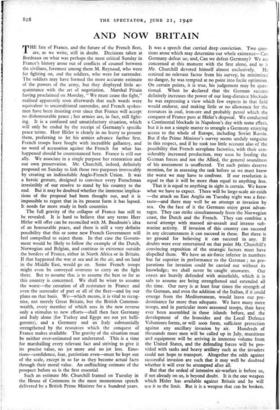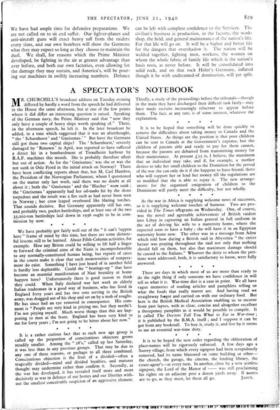AND NOW BRITAIN T HE fate of France, and the future
of the French fleet, are, as we write, still in doubt. Decisions taken at Bordeaux on what was perhaps the most critical Sunday in France's history arose out of conflicts of counsel between the civilians, foremost among them M. Reynaud, who were for fighting on, and the soldiers, who were for surrender. The soldiers may have formed the more accurate estimate of the powers of the army, but they displayed little ac- quaintance with the art of negotiation. Marshal Petain having proclaimed on Monday, " We must cease the fight," realised apparently soon afterwards that such words were equivalent to unconditional surrender, and French spokes- men have been insisting ever since that France will accept no dishonourable peace ; her armies are, in fact, still fight- ing. It is a confused and unsatisfactory situation, which will only be ended by the receipt of Germany's specific peace terms. Herr Hitler is clearly in no hurry to present them, preferring to let his armies advance farther first. French troops have fought with incredible gallantry, and no word of accusation against the French for what has happened should be countenanced here. France is still our ally. We associate in a single purpose her restoration and our own preservation. Mr. Churchill, indeed, definitely proposed on Sunday to link those two purposes irrevocably by creating an indissoluble Anglo-French Union. It was a heroic gesture, designed to convince every Frenchman irresistibly of our resolve to stand by his country to the end. But it may be doubted whether the immense implica- tions of the proposal had been thought out, and it is impossible to regret that in its present form it has lapsed. It needs far more study in both countries.
The full gravity of the collapse of France has still to be revealed. It is hard to believe that any terms Herr Hitler will offer can be reconciled with M. Baudouin's idea of an honourable peace, and there is still a very definite possibility that this or some new French Government will feel compelled to reject them. In that case the Govern- ment would be likely to follow the example of the Dutch, Norwegian and Belgian, and continue in existence outside the borders of France, either in North Africa or in Britain.
If that happened the war, at sea and in the air, and on land in the Middle East, would go on. Some French troops might even be conveyed overseas to carry on the fight there. But to assume that is to assume the best so far as this country is concerned. We shall be wiser to assume the worst—the cessation of all resistance in France and even the surrender of part or all of the fleet—and lay our plans on that basis. We—which means, it is vital to recog- nise, not merely Great Britain, but the British Common- wealth, every member of which sees in the new reverse only a stimulus to new efforts—shall then face Germany and Italy alone (for Turkey and Egypt are not yet belli- gerents), and a Germany and an Italy substantially strengthened by the resources which the conquest of France makes available. The gravity of the situation must be neither over-estimated nor underrated. This is a time for marshalling every relevant fact and striving to give it its precise value, no jot more and no jot less. Emo- tions—confidence, fear, patriotism even—must be kept out of the scale, except in so far as they become actual facts through their moral value. An unflinching estimate of the prospect before us is the first essential.
Such an estimate Mr. Churchill framed on Tuesday in the House of Commons in the most momentous speech delivered by a British Prime Minister for a hundred years. It was a speech that carried deep conviction. Two ques- tions arose which may determine our whole existence—Can Germany defeat us; and, Can we defeat Germany? We are concerned at this moment with the first alone, and to it Mr. Churchill devoted himself almost exclusively. He omitted no relevant factor from his survey, he minimised no danger, he was tempted at no point into facile optimism. On certain points, it is true, his judgement may be ques- tioned. When he declared that the German success definitely increases the power of our long-distance blockade he was expressing a view which few experts in that field would endorse, and making little or no allowance for the resources in coal, iron-ore and probably petrol which the conquest of France puts at Hitler's disposal. We conducted a Continental blockade in Napoleon's day with some effect, but it is not a simple matter to strangle a Germany enjoying access to the whole of Europe, including Soviet Russia. But if the Prime Minister's survey seems unduly sanguine in this respect, and if he took too little account also of the possibility that French aeroplane factories, with their con- siderably increased production, may soon be feeding the German forces and not the Allied, the general soundness of his assessment is unaffected. Yet such points deserve mention, for in assessing the task before us we must know the worst we may have to confront. If our resolution is equal to that it will be more than equal to anything less.
That it is equal to anything in sight is certain. We know what we have to expect. There will be large-scale air-raids —the attack on East Anglia on Tuesday night was a fore- taste—and there may well be an attempt at invasion by sea. On the face of it the Germans enjoy great advan- tages. They can strike simultaneously from the Norwegian coast, the Dutch and the French. They can combine a naval attempt with massed air-assault and intense sub- marine activity. If invasion of this country can succeed in any circumstances it can succeed in these. But there is no ground for believing it can succeed in any. If doubts were ever entertained on that point Mr. Churchill's convincing exposition of the strategic factors must have dispelled them. We have an air-force inferior in numbers but far superior in performance to the German ; no pre- parations for invasion could be carried out without its knowledge; we shall never be caught unawares. Our coasts are heavily defended with minefields, which it is safe 'to assume are being strengthened and extended all the time. Our navy is at least four times the strength of the German, and even the addition of the Italian, if it could emerge from the Mediterranean, would leave our pre- dominance far more than adequate. We have many more troops, and in particular more seasoned troops, than have ever been assembled in these islands before, and, the development of the Ironsides and the Local Defence Volunteers forms, or will soon form, sufficient protection against any ancillary invasion by air. Hundreds of thousands more men will be called up in July, munitions and equipment will be arriving in immense volume from the United States, and the defending forces will be pro- vided with tanks and heavy artillery such as the invaders could not hope_ to transport. Altogether the odds against successful invasion are such that it may well be doubted whether it will ever be attempted after all.
But that the ordeal of intensive air-warfare is before us, if not already on us, is beyond doubt. It is the one weapon which Hider has available against Britain and he will use it to the limit. But it is a weapon that can be broken. We have had ample time for defensive preparations. We are not called on to sit and suffer. Our fighter-planes and anti-aircraft guns will exact heavy toll from the raiders every time, and our own bombers will show the Germans what they may expect so long as they choose to maintain the duel. We shall, for reasons which the Prime Minister developed, be fighting in the air at greater advantage than ever before, and both our own factories, even allowing for the damage they may sustain, and America's, will be pour- ing out machines in swiftly increasing numbers. Defence can be left with complete confidence to the Services. The civilian's business is production, in the factory, the work- shop, the field, and general maintenance of the nation's life. For that life will go on. It will be a higher and better life for the dangers that overshadow it. The nation will be welded together, fighting men, workers, the women on whom the whole fabric of family life which is the nation's basis rests, as never before. It will be consolidated into solid rock, and on that rock Hitler's Germany, inflated though it be with undreamed-of domination, will yet split.































 Previous page
Previous page